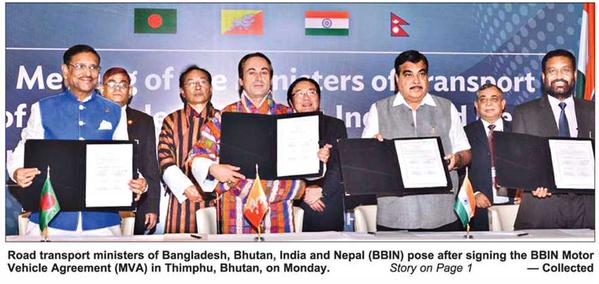ROADWAYS ACCORD AIMS TO RECONNECT SOUTH ASIA
 Shohel Mamun
Shohel Mamun
Four South Asian nations are a week away from inking an inter-connectivity deal that could potentially change the region forever.
Bangladesh, Bhutan, India and Nepal, the BBIN countries, are scheduled to sign a motor vehicle agreement on June 15 at a high-level meeting that will bring the countries’ transport ministers together in Thimphu, the capital of Bhutan.
 The agreement will allow personal, passenger and cargo vehicles to travel across borders to each of the other signatory countries without having to face the hassles of trans-shipment.
The agreement will allow personal, passenger and cargo vehicles to travel across borders to each of the other signatory countries without having to face the hassles of trans-shipment.
Transport Minister Obaidul Quader told the Dhaka Tribune: “The agreement will pave the way for a European Union-like road communication system among the four countries.”
Road Transport Division Secretary Chandan Kumar Dey said: “After signing the agreement, a committee will be formed to work out the details of how the new road connectivity will work.
“When the details are finalised and agreed upon, a protocol will be signed. After that, travellers will be able to enjoy the new connectivity.”
 Bangladeshis will be able to travel by road to India, Nepal or Bhutan in their own private car or aboard a passenger bus, if the agreement is finalised. Likewise, businesspeople will be able to carry goods across borders without trans-shipment arrangements.
Bangladeshis will be able to travel by road to India, Nepal or Bhutan in their own private car or aboard a passenger bus, if the agreement is finalised. Likewise, businesspeople will be able to carry goods across borders without trans-shipment arrangements.
Cabinet Secretary M Musharraf Hossain Bhuiyan told reporters after a cabinet meeting yesterday: “The deal will be signed at a minister-level meeting in Bhutan on June 15. The transport ministers of the four Saarc nations known as BBIN will attend the meeting in Thimphu.”
“The quadrangle comprised of the four countries had a similar mindset and so it was easy to strike the deal,” he added.
The Cabinet approved the draft agreement yesterday.
The four-nation agreement provides for other Saarc nations to join the framework at a later time, he added.
Chandan said: “A day before the ministerial meeting, the participating countries’ transport secretaries will finalise the draft agreement.”
 According to the proposed route, a Bangladeshi traveller going to Nepal must leave the country at Banglabandha to arrive in India’s Phulbari, before heading for the India-Nepal border at Panitanki 31km across Indian territory. From there she can enter Nepal at Kakarvitta.
According to the proposed route, a Bangladeshi traveller going to Nepal must leave the country at Banglabandha to arrive in India’s Phulbari, before heading for the India-Nepal border at Panitanki 31km across Indian territory. From there she can enter Nepal at Kakarvitta.
To travel to Bhutan from Bangladesh, the traveller first exits the country at Burimari to arrive in the Indian town of Changrabandha. Next comes a 91km highway trip through India. At the Indian border town of Jaigaon the traveller then crosses into the Bhutanese town of Phuentsholing.
Bangladeshi travellers will also be permitted to enter India at the Benapole-Petrapole border crossing.
“The draft route will be finalised at the secretary-level meeting,” Chandan added.
The cabinet secretary said: “According to the draft, the four countries will enjoy seamless transit of passenger, cargo and personal vehicles between the countries.
“However, taxes will be fixed separately by the authorities of the four countries and nobody will be allowed to carry products deemed contraband in the countries they are planning to visit.”
At present, Bangladesh and India have a bilateral arrangement on passenger movement but with the new agreement in effect, Bangladeshi trucks and private cars can go on to Nepal or Bhutan via India.
 Nepal and Bhutan are just 100 kilometres from Bangladesh. The initiative is expected to have a positive impact on tourism and trade.
Nepal and Bhutan are just 100 kilometres from Bangladesh. The initiative is expected to have a positive impact on tourism and trade.
The sub-regional BBIN Motor Vehicles Agreement is similar to a Saarc-wide initiative that was never agreed upon because of Indian-Pakistani differences.
The Saarc effort had proposed that private cars, commercial buses, ambulances and cargo trucks be allowed to move freely across the region.
At last year’s Saarc summit in the Nepalese capital Kathmandu, India offered to sign the deal but Pakistan opposed it.
The four other mainland countries of South Asia decided to go ahead with a roadways deal without Pakistan.
*********************************************************
JUNE 10, 2015

